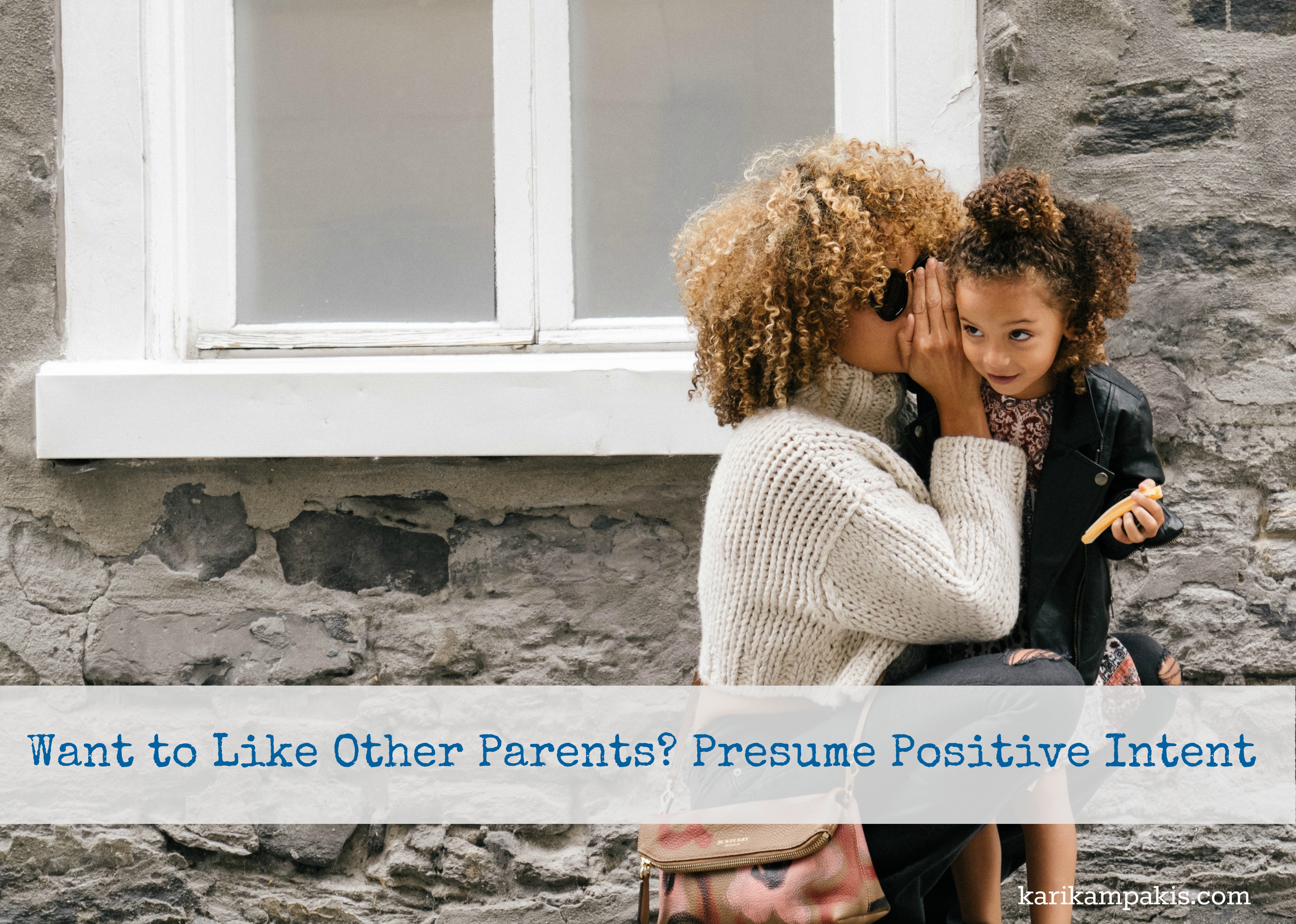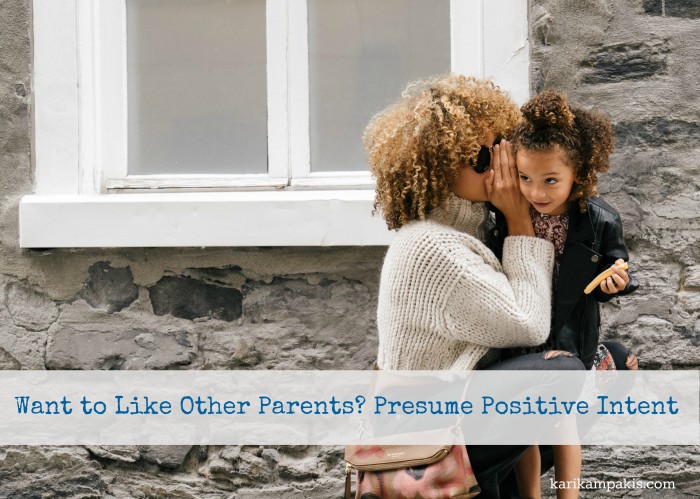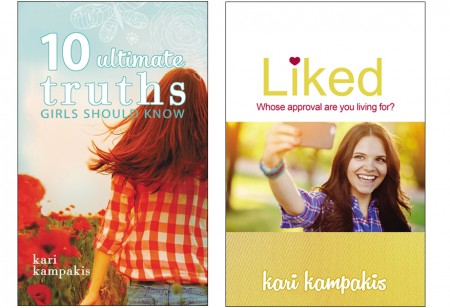Want to Like Other Parents? Presume Positive Intent

It happened when my daughter was 9, and I knew immediately by the look on her face that something was wrong.
While the kids around her were all smiling and running – thrilled that school had ended early – she was trudging toward me with her shoulders slumped and a defeated expression.
Before I could ask, my daughter told me that a girl in her class had invited all her friends except her to eat lunch down the street. Pointing over my shoulder, she showed me the pack, and my heart ached as I turned around and indeed saw all her friends giggling and huddled tight as they waltzed away together.
As my daughter tried not to cry, the Mama Bear in me woke up. I was angry at this girl and her mom, and when my daughter said, “This makes me want to plan something and not include her,” part of me agreed.
Deep down, however, I knew that was an immature reaction. Since I was the adult, I needed to think like one.
So I took a deep breath and tried not to assume the worst. I didn’t know how this lunch had transpired, and trying to guess would be speculation. Rather than go there, I focused on comforting my daughter.
I told her we’d do something special too, and maybe this was an oversight, not an intentional act of meanness. Maybe we should give this girl and her mom the benefit of the doubt.
My daughter can’t keep things in, so the next day at school, she politely told this girl that it hurt her feelings being left out. That afternoon, the girl’s mom texted me to ask if my daughter could play at their house on Friday. At first my daughter was hesitant, but as we talked about how this might be a peace offering, she agreed to go.
When I texted the mom yes, saying my child could come, I got a long text back. The mom said she and her daughter felt awful about hurting my child’s feelings, and it honestly slipped her mind to include us when sending out a quick text the night before.
I thanked her for letting me know, and on Friday my daughter went to their house and had a great time. The incident was put behind them.
It occurred to me as I picked my daughter up – and she came sprinting down the driveway laughing like old friends with this girl – how differently the situation could have played if I’d followed my knee-jerk reaction and let Mama Bear take over.
It could have started a dynamic where the other mom and I started to intentionally leave each other’s daughters out.
It could have stirred up division, anger, and suspicion.
It could have ruined any chance we had of ever truly liking each other.
Sadly, this dynamic happens too often these days, and the ones who pay the biggest price are our kids, who learn to trust their worst assumptions and never develop the skills they need to resolve relationship conflict.
I once asked a principal whom I met through my work with teen girls what advice he had for parents. After thinking a few seconds, he said: Presume positive intent. One thing he often sees is people jumping to conclusions about the intentions of others without knowing the facts.
He believes the media fosters this mindset by constantly feeding us stories of incidents gone wrong that make us naturally suspicious. To presume positive intent, we have to retrain our minds to 1) not automatically assume the worst and 2) presume that people go into situations with positive intent.
Do some parents act deliberately mean and malicious? Of course. I am certain that all of us have encountered parents who like to intentionally target victims (children and adults), stir up suspicion, and craft sneaky schemes.
But in my opinion, parents like that are not the norm. They’re a small part of the parent population who make life harder than it has to be and hurt their families in the process.
Sometimes it’s hard to think clearly when our emotions get involved. Sometimes our imaginations run loose and fall into UMSU mode.
UMSU is shorthand for The University of Making Stuff Up. In my daughter’s case, the UMSU story could sound like this, “You know, I once saw that girl’s mom scowl at my daughter. Come to think of it, she’s scowled at me before too. I bet she’s still mad about that time in first grade when our kids exchanged words on the playground. She’s probably trying to steal my daughter’s friends and make her feel alone.”
That is how a mind presumes negative intent. Here is how a mind presumes positive intent.
“Maybe my daughter was left out by accident. I know I’ve certainly done that before. Maybe the mom is busy and tired like the rest of us, or she’s driving the girls somewhere and only has six seats in her car. Whatever the case, I won’t let it ruffle my feathers. I have bigger things to worry about, and I can use this event to teach my daughter empathy for people who get left out on a regular basis.”
While some parents are untrustworthy, many are not. Many parents just want to raise good kids and be good parents, not intentionally harm others. As parents we have a choice. We can let the bad apples we know (or hear about) taint our view of every parent, or we can presume the best until the evidence proves otherwise. We can parent with skepticism or parent with joy, seeking truth and not revenge when conflict does arise.
That incident with my daughter turned out to be a blessing. She and I both learned invaluable lessons that have helped us in other relationships.
There is always more to a story than what we see or hear, and the key to liking other parents is to parent with that in mind, replacing knee-jerk reactions with honest conversations that allow issues to be resolved, relationships to be saved, and kids to develop the social skills they need to live their best life possible.
******************************************************************************************************************************
Thanks for stopping by today. If you found this message helpful, please share it through the social media below.
I’m grateful for my readers and would love to connect. Join my Facebook community, or find me on Instagram, Twitter, or Pinterest.
I’ve written two books for teen & tween girls designed to empower them through faith. The newest one, Liked, is getting a fantastic response as a unique resource for girls of the digital age, and along with the bestselling 10 Ultimate Truths Girls Should Know, it’s being used widely across the U.S. for small group studies.
Have a great day!
Posted by Kari on January 30, 2017








I love your articles. I will order your book Liked soon as I have an 8 yo daughter. However, my son is 14 yo. Do you know of a book that is like yours but geared toward boys? Thx!!!
Thanks Julie! I get that question all that time, and I was so glad to see recently that my friend Monica at http://www.thegrommom.com will soon be releasing a book called “Boy Mom” that I know will be full of insight and practical advice. Everything she writes is spot-on and as the mom of 4 boys, she is living it out too. She is a great resource I highly recommend!